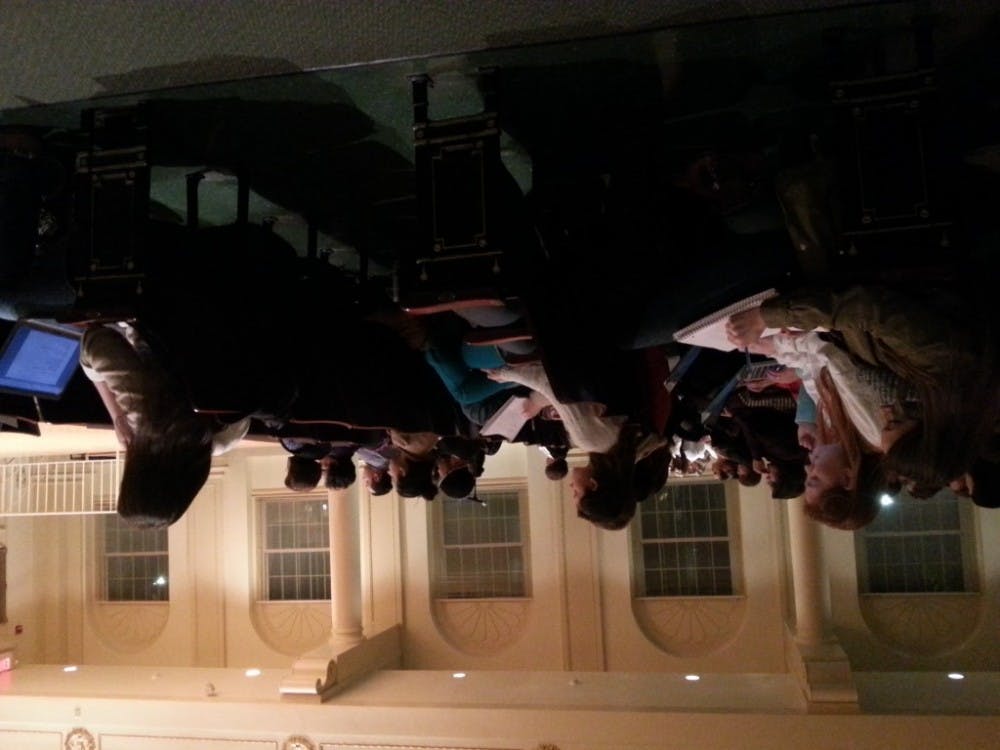As part of the Diversity speaker series, Columbia law professor and columnist at The Nation magazine Patricia Williams told the audience gathered Jan. 23 that headway on race relations are going backward rather than forward.
“For a while in America, we appeared to be engaging in some real racial discussion,” Williams said. “Then within the last 100 years, we seem to have lost the plot.”
Williams characterized this problem in a few different ways, starting with the pervasive idea that talking about racism is in itself racist. She cited the Supreme Court’s decision in 2013’s Shelby County v. Holder, which struck down part of the Voting Rights Act of 1965.
Williams said that Chief Justice John Roberts said that looking for discrimination on the basis of race was wrong and required that the federal government find another way to prove discrimination by states.
“It comes from a misreading of Martin Luther King Jr.’s color blind world,” Williams said of this avoidance of racism as a modern issue. “We all want a color blind world, but there are steps we need to take to get there.”
Similarly, Williams said that people who are not oppressed see that racism is not a serious problem because they do not see it in their daily lives, precisely because they are not an oppressed group. To illustrate, she brought up a study done in Berkeley where students were asked if there was racism on campus.
“All the black students said ‘Yes, there’s lots of racism here’ and all the white students said, ‘No, it’s lovely here,’” Williams said.
Williams also brought up worsening racial divides in America by referencing the disparity in arrests between white Americans and people of color, which she largely attributed to the War on Drugs.
“In post-racial America, the statistics are in some ways worse than they were in the 1950s,” Williams said.
She pointed to data that shows that drug use is about equal across all races, but prosecutions are much higher for people of color. To prove her point further, Williams referenced a law in New York City, where Columbia is located, that says that riding a bicycle is illegal on a sidewalk.
“Those tickets are given almost entirely in black and Latino neighborhoods,” Williams said.
But the sign of lamentable race relations in the United States that Williams devoted much of her time to was the trial of George Zimmerman for the shooting of Trayvon Martin. Williams covered the trial for The Nation and described what happened in the case “depressing.”
Williams described the trial as changing from the trial of Zimmerman to the trial of Martin.
“Despite being the victim of this crime, he was transposed as a thug,” Williams said.
Williams talked about Martin being insinuated to be a plotting criminal who would have been seen as threatening to anyone in the neighborhood and thus reasonably pursued and confronted by Zimmerman. She added that the defense brought up many crimes that had happened in the area by other young, black men, “all of whom happened to not be Trayvon Martin.”
She said that, even before prosecution began, Martin was treated poorly by the legal system.
“His body was kept until his parents filed a missing person’s report, his wet clothes were kept to rot, possibly damaging evidence, and a drug test was run on Martin’s body,” Williams said.
At each step of the trial Williams took the audience through, she mentioned where the prosecution made what she felt were sloppy and uninterested mistakes.
“I don’t fault the defense. They did their job. But the prosecution never stepped up,” Williams said.
On top of the case, Williams brought up “Stand-Your-Ground” laws, which allow a person to use lethal force if they feel threatened, even outside of their home, and laid out data that shows prosecution of incidents involving “Stand-Your-Ground” depend more on the race of those involved than anything else.
“We have had burdens-of-proof for centuries in Anglo-American law that seemed to suffice,” Williams said.
Melissa Jordan, interim director of Elon University’s Multicultural Center, spoke at the end of the speech, concerned that problems with race, particularly surrounding the death of Trayvon Martin and Oscar Grant, the subject of the movie Fruitville Station, are not seen as impacting people of different races.
“This is something everyone needs to stand for,” Jordan said.
Williams agreed, telling the audience that divisions of race exist in all facets of life, from housing to our friends to entertainment.
“Everything from what we watch on TV to online dating sites push us to not see one another as similar,” Williams said.


